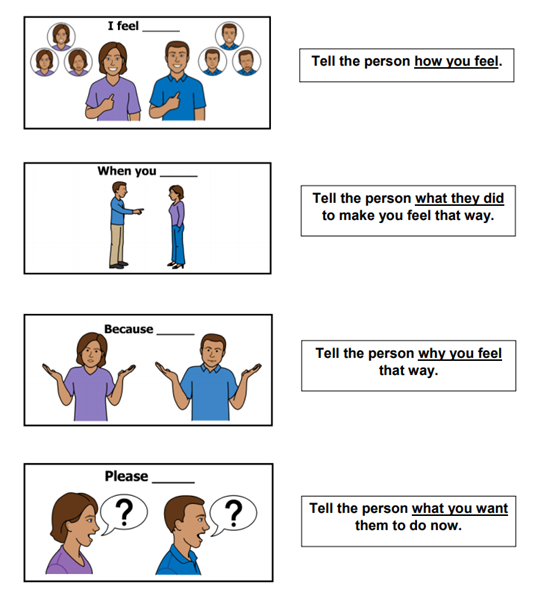We discuss "I" statements in our social skills groups for individuals with Down syndrome. "I" statements are a way to share how we feel in a clear, calm, and respectful way. These statements can help us communicate without blaming another person or making them feel defensive. The basic formula for an "I" statement is: I feel _____ when you _____. Why you feel a certain way and what you would like the person to do differently can also be included. The expanded formula is: I feel _____ when you _____ because _____. Please _____.

Examples
Situation: One of your friends recently entered a romantic relationship. You are single but you would like a boyfriend. Your friend talks about their boyfriend incessantly. This makes you feel sad.
Response: STOP TALKING ABOUT YOUR BOYFRIEND!
Better Response: I feel sad when you talk about your boyfriend because I do not have a boyfriend and I want one. Can we please talk about movies [or another topic of interest] for a while?
Situation: Your housemate borrowed your favorite shirt without asking permission first.
Response: You are the worst housemate! Don't touch my stuff ever again!
Better Response: I feel mad when you borrow my favorite shirt without asking because it is mine and I wanted to wear it today. Please ask me before borrowing my things.
We use these handouts when discussing "I" statements with individuals with Down syndrome. We remind them that being able to use "I" statements effectively and consistently takes practice. In our social skills groups, we help individuals with Down syndrome work up to "I" statements. Before learning about "I" statements, we work on:
-
Identifying emotions
-
Identifying triggers (i.e., situations that make us feel certain emotions)
-
Identifying strategies we can use to manage our emotions
We identify "I" statements as one strategy we can use to manage our emotions. We practice using the basic formula and the expanded formula for "I" statements. We explain that we may need to use multiple strategies to manage our emotions. For example, we may need to take deep breaths or go to our room for a few minutes before we are able to use an "I" statement. Additional resources on managing emotions can be found in the Mental Health section of our Resource Library.
Katie Frank, PhD, OTR/L facilitates a variety of social skills groups virtually and in-person at the Adult Down Syndrome Center.